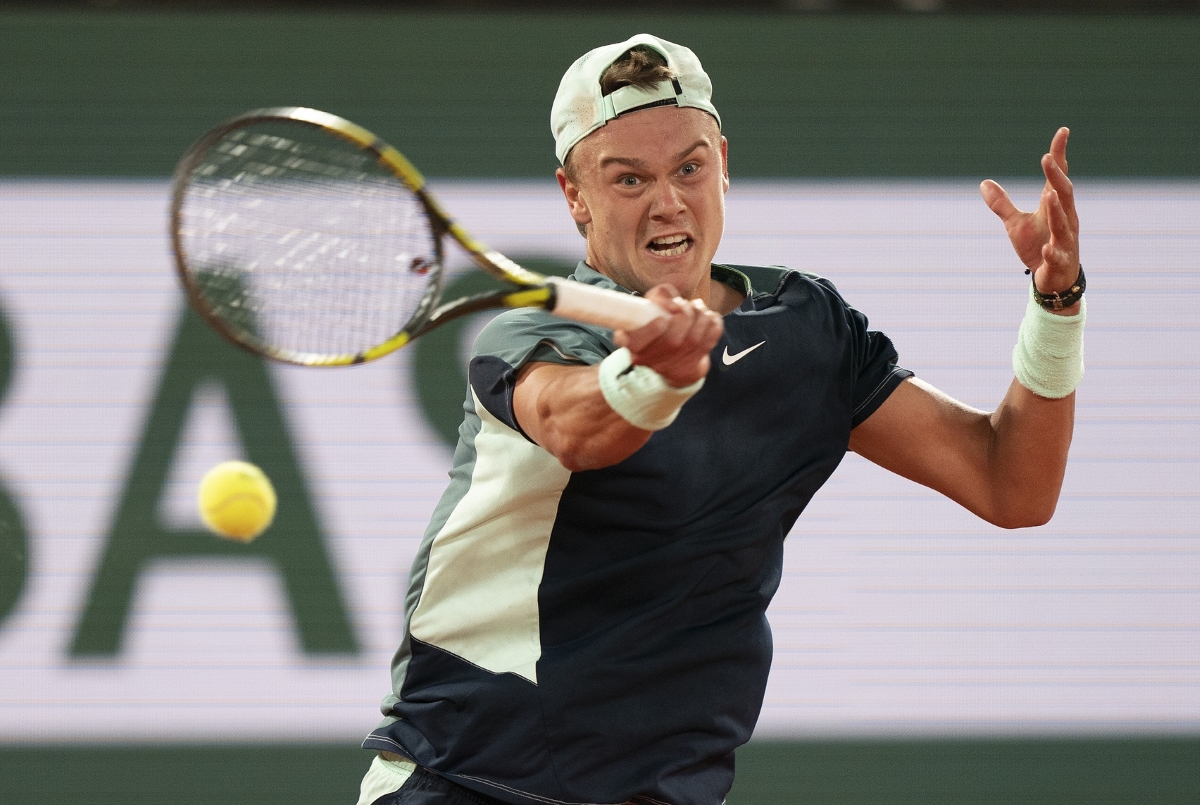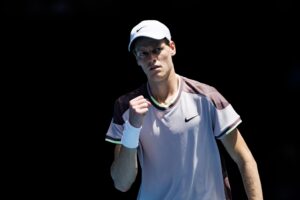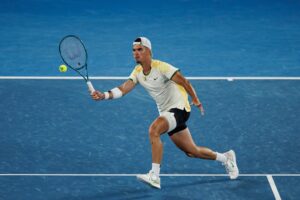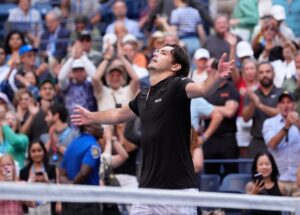It has been widely reported that Rafael Nadal’s withdrawal from the French Open later this month has left the tournament wide open, but in reality that is not true. In Nadal’s absence, it will be a considerable surprise if the winner does not come from what might be called the new “Big Three” of men’s tennis.
The trio come from three different tennis generations, but all three have already won majors: Novak Djokovic, who has already won at Roland Garros twice and who can make it a record 23 Majors with a third French Open title; Carlos Alcaraz, the new young king of men’s tennis, who triumphed at last year’s US Open; and, if he can maintain his recent remarkable form on clay, Daniil Medvedev, the 2021 US Open winner. However, if there is to be a fourth man who can contend with that trio at this year’s French Open, increasingly it looks like Holger Rune.
The Best Young All-Rounder Not Named Alcaraz?
The young Dane turned 20 recently, just a few days before Alcaraz did, and their proximity in age is not the only point of similarity between the two. Put simply, Rune increasingly looks like the best all-round young male tennis player outside Alcaraz and, even more importantly, whatever the gap is between them it appears to be closing fast.
The obvious point of difference between them is that Alcaraz has already won his first Major and in the process risen to world #1, a position that he returned to this week in Rome despite his shock loss to Hungary’s previously unheralded Fábián Marozsán. And yet in every other respect both Alcaraz and Rune look to be the most complete, all-court and, crucially, all-surface players among the many young men who are emerging in the wake of the original Big Three.
That was evident again this week in the Italian capital, particularly in Rune’s defeat of Djokovic in the superb quarterfinal that they contested in the middle of the week. Remarkably, Rune now has a winning record against Djokovic, having won the last two of their three matches. And if his victory in the Paris Masters final last November was extraordinary, especially as it was the culmination of a week in which he became the first man to defeat five players inside the world top 10 to win a Masters event, then his most recent triumph over the great Serb was arguably even more impressive.
Like Watching Young Djokovic versus Old Djokovic
When the two men met in Rome, it really was like watching the Young Djokovic, in the form of Rune, taking on the Old Djokovic, or more accurately the present-day Djokovic. Given that Djokovic is 16 years older than Rune, that perhaps should not have been so surprising. But what was truly surprising, if not astounding, was that Rune made it look as if it may not be too much longer before Djokovic follows Federer and Nadal into retirement, and that is probably the first time that that has ever happened.
Rune broke Djokovic in the very first game of the match and then roared (at times literally) through the rest of the first set to win it 6-2. Then, when the inevitable Djokovic fightback came in the second set, which the Serb eventually won 6-4 after a rain delay, Rune somehow upped his level even further to break Djokovic again at the start of the third set. He then broke him yet again to go 4-0 up in the set and eventually calmly served the match out to win 6-2, 4-6, 6-2.
The nature of the whole match was evident in its longest rally, which went on for so long that it was effectively “reset” at least once, before Rune produced the most staggeringly imaginative and brilliantly executed drop-shot, almost literally carving the ball in two to land it just over the net before it bounced back towards the net, to win it. And it is in that astonishing combination of all-out power and utter deftness of touch that Rune most resembles Alcaraz.
Will Rune Be The McEnroe to Alcaraz’s Borg?
The only slight reservation about the emergence of Alcaraz over the last year or so has been the almost bizarre fear that he might just be too good for the rest of his contemporaries, leading to the kind of domination that Pete Sampras achieved, at least on grass and hardcourt (the great American never mastered clay and so never won the French Open), in the 1990s.
Even Alcaraz’s closest rivals, such as Italy’s Jannik Sinner, have looked relatively one-dimensional compared to him and certainly none of them have yet achieved the kind of statement win – of a Major, or at least a Masters – that Alcaraz has already made virtually his trademark. But now Rune has shown that he, too, has the sheer completeness of game to compete with and even beat the young Spaniard.
Sport, of course, thrives on rivalry and Alcaraz-Rune has the potential to be the next great rivalry in men’s tennis and even one that matches the very greatest rivalries in the sport, such as the “Trivalry” between Djokovic, Nadal and Federer, or the simpler two-man rivalries of Sampras-Agassi or Becker-Edberg.
There is even the possibility that it could match the oppositional intensity of arguably the greatest single rivalry in men’s tennis, namely that between Borg and McEnroe at the start of the 1980s, which was immortalised for anyone not alive to see it at the time in the sublime 2017 film of the same name, Borg vs McEnroe or just Borg-McEnroe as it is often called. That is not just the best film about tennis ever made but arguably the best (and certainly the most artistic) film about any sport ever made.
Borg-McEnroe was a classic contrast of styles, with the baselining Borg up against arguably the best (and certainly the most inventive) serve-volleyer that tennis has ever seen. There is certainly not that contrast of styles with Alcaraz-Rune, in that both are complete all-court players who are equally comfortable on the baseline or at the net. But there might just be a similar contrast in psyches, or at least public perception of those psyches, in that Alcaraz, despite being infinitely more outgoing than Borg, is already similarly universally popular whereas Rune is perceived as being much chippier and, frankly, less mature than Alcaraz.
Maybe The Rivalry Will Begin In Paris Later This Month
Maybe the Alcaraz-Rune rivalry will really catch fire at Roland Garros later this month, if the two young titans of men’s tennis are drawn against each other at any point. Certainly the thought of them playing each other, or either one of them playing Djokovic, over five sets is a mouth-watering prospect for any true tenniseaste.
Before Paris, though, Rune has to conquer Rome and that will not be easy. This weekend, he will face his fellow Scandinavian and last year’s Roland Garros runner-up, Norway’s Casper Ruud, in the semifinal. And if he wins that, he will face either Daniil Medvedev, who has undergone an almost Kafka-esque metamorphosis on clay this week, or Stefanos Tsitsipas in the final.
Nevertheless, regardless of the outcome in Rome, Rune will surely go to Roland Garros as the shiniest and sleekest of dark horses. In defeating the great Djokovic twice in succession, and doing so with such relative ease on the second occasion, he has definitively proved that he is a young man to watch. And he might yet emerge as the biggest and most natural rival for Alcaraz in the decade ahead.
Main photo credit: Susan Mullane-USA TODAY Sports






